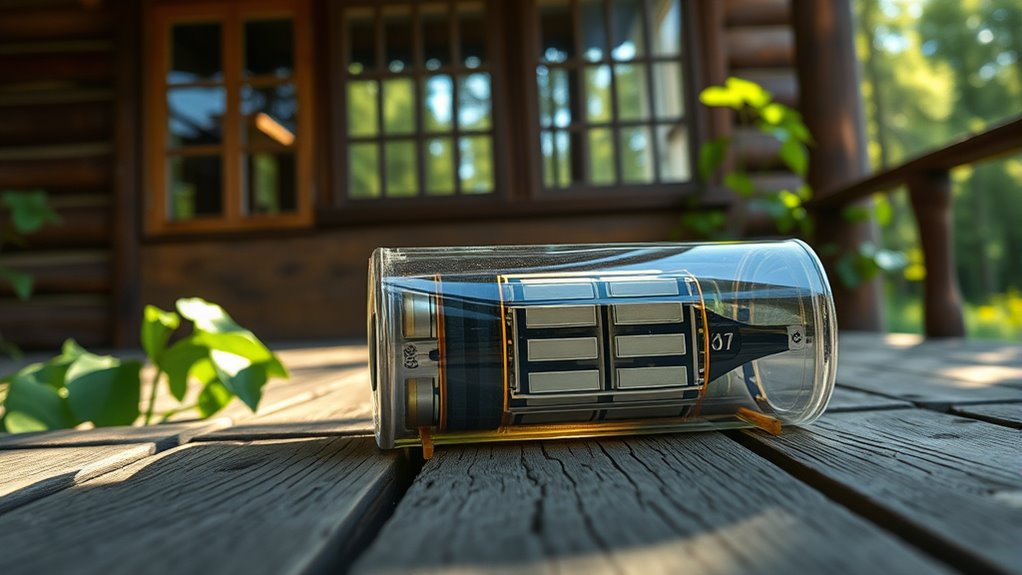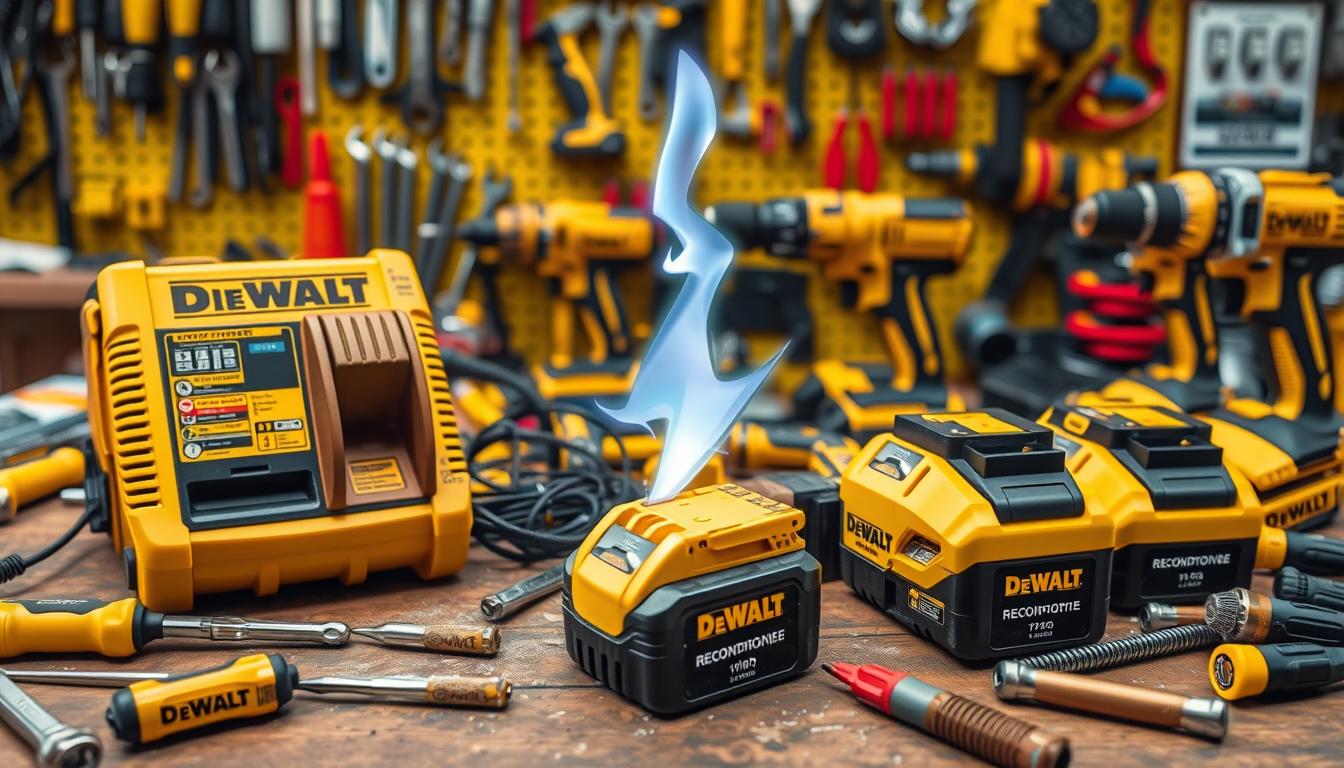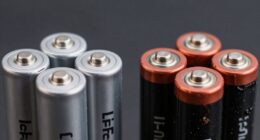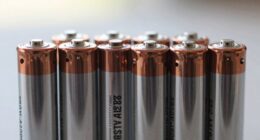Zinc-air batteries can power your off-grid cabin thanks to their high energy density, lightweight design, and ability to draw oxygen from the air for efficient energy storage. They work well with renewable sources like solar and wind, storing excess energy for when sunlight or wind is unavailable. However, their lifespan can be affected by environmental factors like humidity and temperature, and they may require maintenance over time. If you want to know more about their performance and longevity, keep exploring.
Key Takeaways
- Zinc-air batteries are lightweight and support renewable energy storage, suitable for powering off-grid cabins.
- They use oxygen from the air, eliminating bulky internal air supply components.
- Capacity fade and limited lifespan can impact long-term reliability for cabin power needs.
- Environmental factors like humidity and temperature affect their durability and performance.
- Regular maintenance and proper sealing are essential to maximize their effectiveness in off-grid applications.
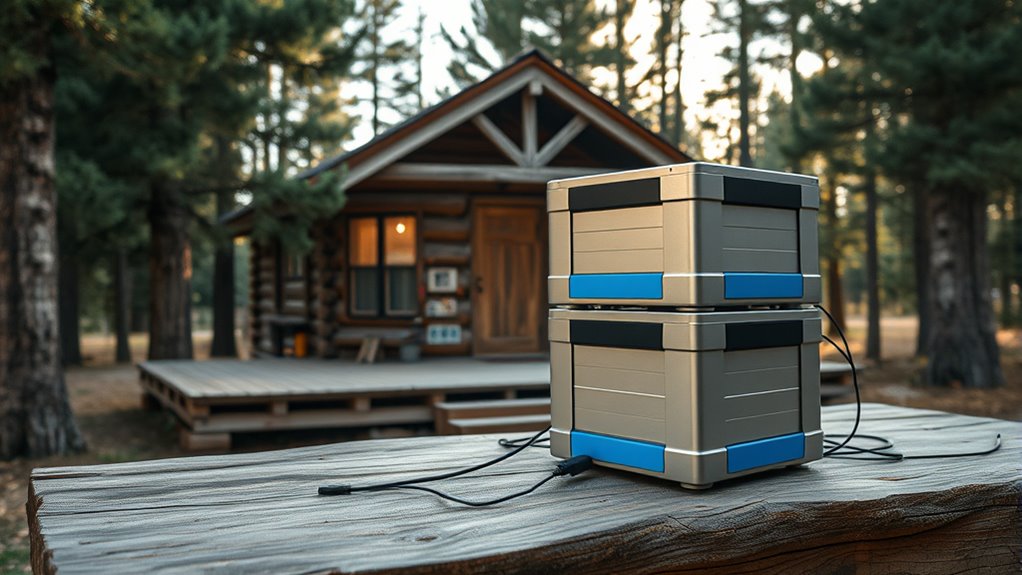
Zinc-air batteries are a promising type of energy storage that harnesses oxygen from the air to generate power. As someone looking to make your off-grid cabin more sustainable, understanding how these batteries work can help you determine if they’re a good fit for your renewable energy setup. Unlike traditional batteries, zinc-air batteries use oxygen from the environment, which means they don’t need bulky internal components to supply air. This design allows them to be lightweight and compact, making them ideal for remote locations where space and weight matter.
One of the main advantages of zinc-air batteries is their potential to support renewable energy sources like solar or wind power. When your solar panels generate excess energy during the day, you can store that power in zinc-air batteries for use when the sun isn’t shining. This ability to store renewable energy efficiently is vital for off-grid living, as it guarantees you have a reliable power source regardless of weather conditions. However, it’s important to note that while zinc-air batteries excel in energy density and cost-effectiveness, they face challenges related to battery longevity. Over time, the chemical reactions inside these batteries can lead to capacity fade, meaning they won’t last as long as some other types of batteries without proper maintenance or replacement.
To maximize their lifespan, you’ll need to pay attention to factors like humidity, temperature, and proper sealing of the battery system. High humidity can cause corrosion, and extreme temperatures can accelerate degradation, both of which diminish battery longevity. Regular maintenance, including monitoring the electrolyte levels and ensuring the battery remains sealed against environmental contaminants, can help extend their service life. Additionally, understanding the importance of battery maintenance and environmental factors can significantly improve the performance and lifespan of zinc-air batteries. While they may not have the same lifespan as lithium-ion batteries, zinc-air batteries can still be a cost-effective and environmentally friendly option for off-grid cabins if you’re willing to invest in proper care and replacements over time.
Frequently Asked Questions
How Long Do Zinc-Air Batteries Typically Last in Off-Grid Applications?
You might wonder about battery lifespan and maintenance frequency for zinc-air batteries in off-grid setups. Typically, these batteries last around 1 to 3 years, depending on usage and conditions. They require minimal maintenance, mainly keeping them dry and ensuring proper sealing. Since they’re not rechargeable, you’ll need to replace them once they’re depleted. Proper handling and understanding their lifespan help you plan your off-grid power needs effectively.
Are Zinc-Air Batteries Environmentally Friendly Compared to Other Options?
Think of zinc-air batteries as the garden of energy options—you want to choose the healthiest plants. They’re generally eco-friendly because they produce fewer emissions. However, recycling challenges and resource sustainability matter; zinc-air batteries can be tricky to recycle properly, impacting their environmental friendliness. Compared to other options, they’re a better choice for sustainability if recycling processes improve, helping you power your off-grid cabin responsibly without harming the environment.
Can Zinc-Air Batteries Handle Extreme Weather Conditions?
You wonder if zinc-air batteries can handle extreme weather conditions. While they excel in environmental friendliness, their temperature resilience can be constrained, especially in very cold or hot climates. Mechanical durability is generally good, but they may be more vulnerable to physical shocks or pressure changes. For off-grid cabins in harsh climates, consider batteries with higher temperature resilience and mechanical durability to ensure reliable power during extreme weather.
What Is the Cost Comparison Between Zinc-Air and Traditional Batteries?
You’ll find that zinc-air batteries are generally more affordable than traditional batteries, thanks to their simple design and abundant materials. Market availability is growing, but storage requirements are important—these batteries need dry, well-ventilated spaces to prevent moisture damage. While initial costs may be lower, consider long-term costs and availability to guarantee reliable power for your off-grid needs.
How Easy Is It to Replace or Recharge Zinc-Air Batteries in Remote Locations?
Imagine you’re off-grid and need to replace or recharge zinc-air batteries. Remote maintenance is straightforward if you carry spare cells or use refillable ones, but it’s not as simple as swapping traditional batteries. You’ll need to contemplate battery recycling options to dispose of used cells responsibly. While rechargeability is limited, some models can be refilled with air, making replacements easier, though planning ahead is essential for continuous power.
Conclusion
Imagine zinc-air batteries as the quiet guardians of your off-grid cabin, silently fueling your independence. Like a steady lighthouse guiding ships safely home, they promise reliable power in the darkness. As you embrace this sustainable energy source, you’re lighting a path toward a greener future. With each charge, you nurture the flame of self-sufficiency, proving that sometimes, the simplest solutions can shine brightest—just like the humble zinc-air battery, illuminating your journey ahead.

